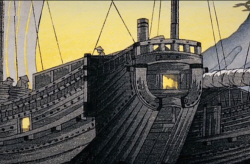I thought I should share some interesting tidbits from Andrew Marr’s ‘History of the World’ to let you in on what my yesterday went thinking about. A lot of this is owed to that magical website called Wikipedia and, of course, the BBC. Here goes:
1. Sakoku (鎖国, “chained country”) was the foreign relations policy of Japan under which no foreigner could enter nor could any Japanese leave the country on penalty of death. This policy was enacted by the Tokugawa shogunate under Tokugawa Iemitsu through a number of edicts and policies from 1633–39 and remained in effect until 1853 with the arrival of the Black Ships of Commodore Matthew Perry and the forcible opening of Japan to Western trade. One of the methods of enacting this policy was to draw holes in Japanese ships above a certain height. This ensured that the ships could never venture too far into the seas as they would have sunk if they did. See the image below.
2. The word ‘Algorithm’ is derived from the name of the Persian mathematician Muḥammad ibn Mūsā al-Khwārizmī whose name’s latinized version transliterates to be Algorithmi. He lived from 780 C.E to 850 C.E. and he was a brilliant mathematician, astronomer and geographer. In the twelfth century, Latin translations of his work on the Indian numerals introduced the decimal positional number system to the Western world. His ‘Compendious Book on Calculation by Completion and Balancing’ presented the first systematic solution of linear and quadratic equations in Arabic. In Renaissance Europe, he was considered the original inventor of algebra, although it is now known that his work is based on older Indian or Greek sources. He revised Ptolemy’s Geography and wrote on astronomy and astrology.
Some words reflect the importance of al-Khwarizmi’s contributions to mathematics. “Algebra” is derived from al-jabr, one of the two operations he used to solve quadratic equations. His name is also the origin of (Spanish) guarismo and of (Portuguese) algarismo, both meaning digit. For any one doubting the scientific credentials of the scholars from the Islamic world, I think this should answer it.
3. Once the Daoist monk Ch’ang Ch’un met Genghis Khan close to the Afghanistan border. The first question Genghis Khan asked him was if the monk had some secret medicine that could make him immortal. The monk’s negative answer disheartened Genghis, and he rapidly lost interest in the monk. However, it seems that Genghis Khan achieved an immortality of a different kind. In 2003 a groundbreaking historical genetics paper reported that today more than 16 million men are direct descendants of Genghis Khan. That’s 1 in every 200. The Genghis Khan gene lives one.
4. In 1796, Edward Jenner conducted an experiment on eight-year-old James Phipps. Jenner inserted pus taken from a cowpox pustule and inserted it into an incision on the boy’s arm. He was testing his theory, drawn from the folklore of the countryside, that milkmaids who suffered the mild disease of cowpox never contracted smallpox, one of the greatest killers of the period, particularly among children. Jenner subsequently proved that having been inoculated with cowpox Phipps was immune to smallpox. He submitted a paper to the Royal Society in 1797 describing his experiment, but was told that his ideas were too revolutionary and that he needed more proof. Undaunted, Jenner experimented on several other children, including his own 11-month-old son. In 1798, the results were finally published and Jenner coined the word vaccine from the Latin ‘vacca’ for cow.
Jenner was widely ridiculed. Critics, especially the clergy, claimed it was repulsive and ungodly to inocculate someone with material from a diseased animal. A satirical cartoon of 1802 showed people who had been vaccinated sprouting cow’s heads. But the obvious advantages of vaccination and the protection it provided won out, and vaccination soon became widespread. In 1979, the WHO announced complete eradication of small pox. Edward Jenner, the father of immunology, would have been very happy to know of this. To quote Andrew Marr, “He saved more lives than all the politicians of the world put together.”
I think that’s a good thought to leave you with. I will see you later.
